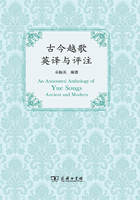
Comments and Annotations
This song, also entitled “Song of the Queen of Yue” (《越王夫人歌》), is taken from Annals of the States of Wu and Yue (《吴越春秋》). It expresses the queen’s deep sorrow over the loss of her state and love for her homeland. The birds symbolize freedom, which the queen cherishes, and the rhetorical questions serve to produce an emphatic effect.
In 494 BC, the State of Yue, having been defeated by the State of Wu, had to sue for peace, and Fuchai (?—473 BC), the king of Wu, agreed under the condition that the king of Yue, Goujian (520—465 BC), should go to the capital of Wu as a hostage.
When he left for the capital of Wu, seeing that his officials were sorrow-stricken, Goujian said, “Death is what men are afraid of, and yet in my mind there’s not the slightest fear of it.” Saying so, he stepped on board the boat and left without looking back. The birds hovering freely overhead, the queen, leaning on the shipboard, improvised the present song.
Some people think that the birds symbolize the forces of Wu, and thus they interpret the song accordingly. A contextual survey will tell them that they are wrong — somewhere in the song the queen says “How I wish I were one of th’ soaring birds!” About the formative setup of the song and the interpretation of “飞鸟”, please refer to Appendix I: Inquiries and Discussions, No. 4.